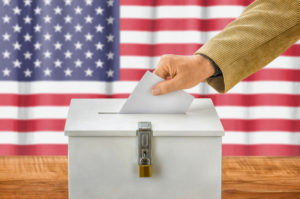
Happy Election Day! I hope everyone was able to make it out to the polls or mail in their ballots for today’s midterm elections.
While we wait to see the results later today, I wanted to take a look at a few noteworthy state tax measures, initiatives, amendments and proposals across the country.
Carbon State Tax Initiative: Washington
Washington’s Initiative 1631 would impose a tax on carbon emissions from companies that either sell or use fossil fuels; it would be the first of its kind across the country.
What would this new state tax cost companies? The Tax Policy Center explains, “The proposed rate is $15 per metric ton of carbon emissions beginning in 2020 with $2 annual increases until the state meets its emissions target.” The Tax Foundation specifies the target as, “Reducing overall emissions to 25 percent below 1990 levels by 2035, and by 50 percent below 1990 levels (or 70 percent below the state’s expected emissions for that year) by 2050.”
It’s worth noting this isn’t the first time Washington voters have seen this issue on a ballot; a similar proposal was rejected just two years ago. However, this year’s version designates the revenue is to be spent on environmental programs, whereas 2016’s version would have reduced other state taxes, including sales tax.
Transportation State Tax Propositions: California, Colorado & Missouri
Three states have gas and transportation propositions on this year’s ballot.
- California’s Proposition 6 gives voters the chance to repeal a 12-cent state tax on gas and a $100 fee on electric vehicles that the Legislature approved last year. In addition to repealing the gas tax increase, the measure would also require that voters approve any future fuel tax or vehicle fee increases in the future.
- Colorado’s Propositions 109 and 110 both determine how transportation projects would be funded. CNBC reports, “Proposition 110 would increase the sales tax rate from 2.9 percent to 3.52 percent over a 20-year period to help cover the cost, while a vote for Proposition 109 would instead use money from the general fund.” What if both of them pass? Coloradoan explains it would get complicated:
The two propositions would work together for the most part, meaning there would be additional revenue for transportation projects…but the two conflict in one specific area. Proposition 109 eliminates the third and fourth year of transportation funding — about $1.5 billion — set aside by Senate Bill 267, passed by the Legislature in 2017. Proposition 110 does not eliminate those dollars. “Should both pass, I believe the courts will need to determine which takes precedent,” [spokeswoman Amy] Ford said. “We would need to go back and do a full analysis of the dollars available from 109,” look at the overlap with Proposition 110 projects, how much additional money would be needed to fund all Proposition 109 projects, where money might be shifted to other priority projects that are not included in the Proposition 110 list.
- Missouri’s Proposition D would increase the state tax per gallon over the next four years by 10 cents.
Marijuana State Tax Proposals: Michigan & North Dakota
Michigan’s Proposal 1 and North Dakota’s Measure 3 give voters the opportunity to join the ranks of states that have legalized marijuana. While Michigan’s proposal legalizes and sets up a state tax on purchases, North Dakota’s only legalizes the drug. However, the Tax Policy Center believes that if the measure passes the state will likely set up some sort of tax system to take advantage of the sizable revenue.
Soda State Tax Measures: Oregon & Washington
Oregon’s Measure 103 and Washington’s Initiative 1634 both have to do with preventing the states from taxing soda, despite proponents promoting that they’d ban state tax on all groceries. As the Tax Policy Center explains, “Washington (like most other states) already exempts groceries from its sales tax and Oregon doesn’t even have a sales tax.”
State Tax Restrictions: Arizona, Florida & Oregon
Several states’ ballots include propositions, measures and amendments that would restrict future state taxes.
- Arizona’s Proposition 126 would restrict the state from adding new or increasing sales taxes on services. The Tax Policy Center explains that, while proponents of the ban say it would help low-income families by making childcare, healthcare and veterinarian services tax-free, the state isn’t likely to tax these areas. “Instead, this initiative would solidify exemptions on mostly high-end services such as gym memberships, car washes, and digital products like Netflix, that are absent from Arizona’s sales tax base but which other states have recently taxed.”
- Florida’s Amendment 5 would make it more difficult for future state tax increases by requiring the Legislature has a two-thirds supermajority approval for future measures.
- Oregon’s Measure 104 extends the existing supermajority for state tax hikes to include tax deductions, credits and exemptions.
As you can see, there are a lot of interesting proposals on ballots around the country! Keep an eye on where voters land on these issues; if your company currently has economic nexus in any of these states, or if it does in the future, they may directly affect your business.
Do you want to know more about how various state tax laws may affect your organization? Contact me today! I’d be happy to answer your questions.
Miles Consulting Group, Inc. is a professional service firm in San Jose, California specializing in multi-state tax solutions. Our firm addresses state and local tax issues for our clients, including general state tax consulting, nexus reviews, tax credit and tax incentive maximization, income tax and sales/use tax planning and other special projects. To learn more, contact us today at www.MilesConsultingGroup.com.


















